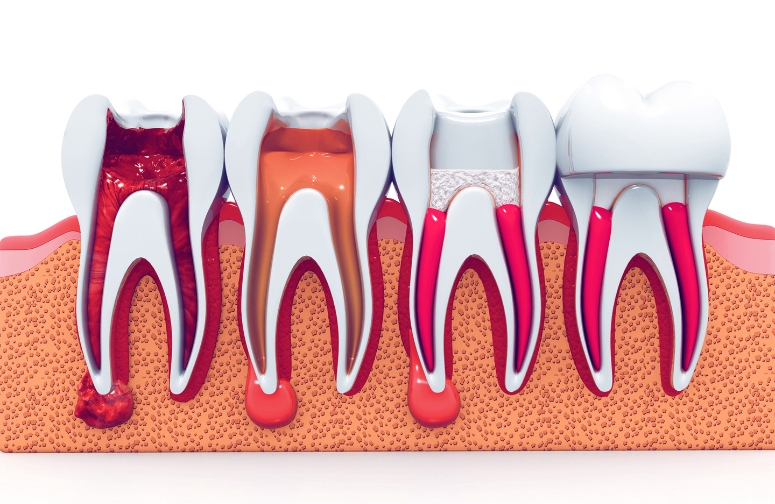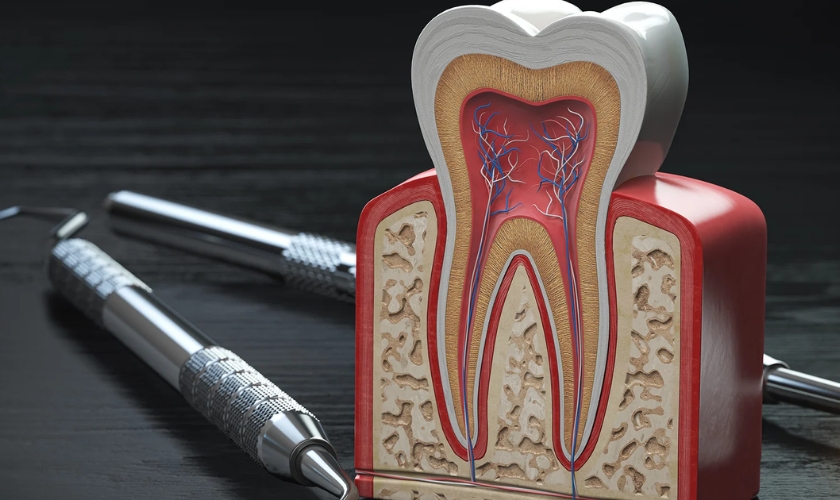
An infected root canal can cause significant discomfort and pain, often requiring immediate attention. While professional dental care is crucial for treating an infected root canal effectively, there are home remedies you can use to alleviate symptoms temporarily.
Today’s blog explores various methods to manage suffering till you get a dental appointment, with insights from Dentists on when to seek professional help.
Understanding Root Canal Infections
A root canal infection occurs when bacteria infiltrate the tooth pulp, resulting in irritation and infection. Common symptoms include:
– Severe toothache or pain
– Swelling and tenderness in the gums
– Sensitivity to hot or cold temperatures
– Persistent bad breath or taste
– Swollen lymph nodes
If you suspect a root canal infection, It’s critical to get in touch with a dentist very away. However, if immediate care is unavailable, these home remedies can help manage symptoms.
Home Remedies for Managing Root Canal Infection Symptoms
While these remedies won’t cure the infection, they can provide temporary relief and make symptoms more manageable until you can visit a dentist.
1. Saltwater Rinse
Rinsing with saltwater is an easy and efficient method to reduce inflammation and kill bacteria in the mouth.
Instructions:
– In a glass, combine one teaspoon of salt in warm water.
– Before spitting it out, swish the solution around your mouth for thirty seconds.
– Repeat several times a day for relief.
2. Cold Compress
One useful tool for reducing swelling and numbing discomfort in the afflicted area is using a cold compress.
Instructions:
– Using a fresh towel, wrap a few ice cubes or use a cold pack.
– Apply the compress to the outside of your cheek near the infected area.
– Hold for 15 minutes, then remove for 15 minutes. Repeat as needed.
3. Over-the-Counter Pain Relievers
Non-prescription analgesics can aid in the management of pain and inflammation caused by a root canal infection.
Instructions:
– Take ibuprofen or acetaminophen as directed on the packaging.
– Avoid aspirin, especially in children, as it can cause complications.
4. Clove Oil
Clove oil contains eugenol, a natural anesthetic and antibacterial agent that can provide relief from tooth pain.
Instructions:
– When a cotton ball is dipped in clove oil, place it on the affected tooth.
– Let it sit for a few minutes, then remove it.
– Use clove oil sparingly to avoid irritation.
5. Garlic
The natural antibacterial qualities of garlic can aid in the fight against illness and reduce pain.
Instructions:
– To extract the liquid from a clove of garlic, crush it.
– Crushed garlic can be applied to the afflicted tooth, or a clove can be softly chewed.
– Rinse your mouth with warm water after a few minutes.
6. Hydrogen Peroxide Rinse
A hydrogen peroxide rinse can help eliminate bacteria and reduce plaque buildup.
Instructions:
– Equal parts water and 3% hydrogen peroxide should be combined.
– Before spitting the solution out, swish it around in your mouth for thirty seconds.
– Afterward, rinse your mouth with water to get rid of any leftovers.
7. Peppermint Tea Bags
Peppermint has soothing properties that can relieve pain and inflammation.
Instructions:
– Once a peppermint tea bag is steeped in boiling water, allow it to cool.
– Apply the tea bag to the affected area for 15-20 minutes.
– Use as needed for temporary relief.
8. Maintain Good Oral Hygiene
Maintaining proper dental care might help stop additional infections and promote healing.
Instructions:
-Use a soft-bristled toothbrush twice a day to gently clean your teeth.
– Floss every day to get rid of plaque and food residue in between teeth.
– To lessen oral microorganisms, use an antimicrobial mouthwash.
When To Seek Professional Help?
While these home remedies can offer just short-term respite, it’s important to get expert dental treatment for a root canal infection. Dentists in Winfield emphasize the importance of timely therapy to stop problems from happening, such the illness spreading or tooth loss.
Signs That Require Immediate Dental Attention
- Persistent or Severe Pain: If the pain is unmanageable or persists despite home remedies, contact a dentist immediately.
- Fever: Fever might be a sign that the illness is spreading and requires urgent attention.
- Swelling: Significant swelling in the face or jaw should be evaluated by a dental professional.
- Difficulty Breathing or Swallowing: These symptoms could indicate a severe infection and require emergency care.
Preventing Future Root Canal Infections
Prevention is always better than cure. Adhere to these tips to reduce the risk of root canal infections:
- Regular Dental Check-Ups: Make time for regular dental checkups for cleanings and examinations.
- Promptly Address Dental Issues: Treat cavities, cracked teeth, and other dental problems early to prevent infections.
- Avoid Tobacco Products: Using tobacco products and smoking can increase the risk of oral infections and complications.
- Balanced Diet: Consume a diet high in healthy grains, fruits, and vegetables to promote dental health.
So, while home remedies can offer temporary relief from the symptoms of an infected root canal, they don’t take the place of expert dental treatment. Seeking prompt treatment from dental professionals, such as dentists in Winfield, is essential for effectively addressing the infection and preventing further complications.
By maintaining good oral hygiene and being proactive about dental health, you can reduce the risk of root canal infections and enjoy a healthy, pain-free smile.
Frequently Asked Questions
Some herbal remedies, such as chamomile or sage tea, may have soothing and anti-inflammatory properties that can help manage symptoms. Chamomile has mild antiseptic properties that can soothe the gums, while sage is known for its antibacterial effects. However, these should only be used as temporary relief measures and not as a substitute for professional dental treatment.
Oil pulling involves swishing oil, typically coconut oil, for ten to fifteen minutes in the mouth to lessen bacteria and improve oral health. While oil pulling can help maintain oral hygiene, it should not be relied upon to treat an infected root canal. It may provide some relief by reducing bacterial load, but professional treatment is necessary to address the underlying infection.
Probiotics can contribute to overall oral health by balancing the oral microbiome and reducing harmful bacteria. Taking probiotic pills or eating foods high in probiotics, such as kefir and yogurt, may help maintain oral health and support the healing process. However, they are not a cure for an existing root canal infection and should be used alongside professional care.





